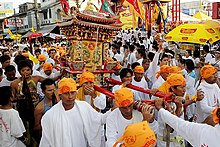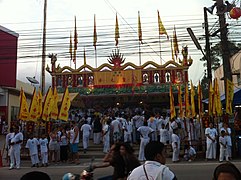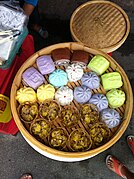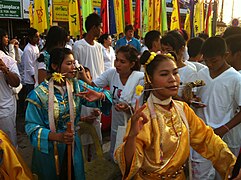Festival of the nine imperial gods
The festival of the nine imperial gods ( Chinese 九 皇爺 誕 / 九 皇爷 诞 , Pinyin Jiǔ huángyé dàn , Jyutping Gau 2 wong 4 each 4 daan 3 - "Festival for the birth of the nine imperial gods ") is a festival of Daoist origin, that of Chinese overseas is celebrated in Southeast Asia, particularly Malaysia , Singapore and Thailand . It takes place on the first nine days of the ninth month according to the Chinese lunar calendar , according to the Gregorian calendar this corresponds to the end of September or October. The festival is particularly celebrated where there is a large ethnic group of people, such as Singapore, Penang , Phuket and the Chinese Quarter of Bangkok . The “nine imperial gods” correspond to the constellation known in the west as the great bear .
In order to cleanse their body and mind, the participants of the festival forego certain foods (meat, fish, seafood, eggs and dairy products) but also intensive spices such as garlic , chives and onions as well as stimulants such as tobacco and alcohol during this period . Due to this aspect is the celebration in Thailand as Thesakan Kin Che - Thai เทศกาล กินเจ - known what inaccurately as "vegetarian feast" - English Vegetarian Festival - will be played. Shops and food stalls which conform to this rule are feed, in time with the yellow with the red flag characters 齋 / 斋 , Zhai , Jyutping Zaai 1 - "fast, meatless food, internal cleaning, cell , deposited exchange " - marked. Paradoxically, Thailand has become a tourist attraction due to the high number of visitors. The practice of renunciation and the aspect of internal purification - mental and physical - are almost completely in the background in today's festival. Only the renunciation of meat is retained by consuming the sometimes elaborate vegetarian tofu dishes that imitate meat products. (see also Carnival - carne levare - "take away meat", Cheung Chau Dajiu Festival )
During the holidays find colorful processions take place through the streets of the city which also attract a large number of non-religious visitors. Some participants of the festival go into a trance and become media of the spirits - ม้า ทรง mah song . They prove their supposed invulnerability through extraordinary acts of self-mortification: They run over fire , pierce their cheeks with sharp objects or climb a ladder made of swords. This aspect is unknown in China itself and could be borrowed from the Tamil-Hindu Thaipusam festival.
history
The origins of the festival are not fully understood. There is no such festival in China itself. Only the ninth day of the ninth month - 九月初九 - the climax and end point of the Festival of the Nine Emperor Gods - was (see part as "double nine-day" Double Nine Festival ) celebrated because the Nine particularly powerful, the sky, the number embodying the Yang principle applies. According to local tradition, the festival in Phuket has been celebrated since the mid-19th century. It is said to have been first committed in 1825 in Ban Kathu , where many tin miners who had immigrated from the southern Chinese province of Fujian lived at the time . Such an early date is, however, doubted by some authors. According to the most popular story about the origins of the festival , an epidemic - malaria - is said to have raged during a visit by a Chinese theater troupe to entertain the tin workers and their families with Chinese operas . The members of the theater troupe also fell ill and could not play. It occurred to them that it was the beginning of the ninth month and that they had not fasted in honor of the nine emperor gods. A man was then sent to China to “invite” the nine imperial gods to Phuket with a ceremony. The following year the theater troupe came back to Phuket and celebrated the “vegetarian festival” for the first time with the local Chinese. The epidemic soon came to an end. In Penang, the festival in its current form has only been known since the 1880s, when it was possibly introduced by a trader from Phuket.
The Hindu Navratri - "Festival of the Nine Nights" - takes place during the same period.
See also
literature
- Eric Cohen: The Chinese Vegetarian Festival in Phuket. Religion, Ethnicity, and Tourism on a Southern Thai Island. White Lotus Press, Chiang Mai, Bangkok 2001, ISBN 978-974-7534-89-4 .
- Jean DeBernardi: Rites of Belonging: Memory, Modernity, and Identity in a Malaysian Chinese Community. Stanford University Press, Stanford CA 2004. Chapter "Performing Magical Power: The Nine Emperor Gods Festival", pp. 182-216, ISBN 978-0-804-74486-7 .
- Pattana Kitiarsa (Editor), Jean DeBernardi (Author): Religious Commodifications in Asia. Marketing Gods. Routledge - Imprint of Taylor & Francis Group, New York, USA 2007, ISBN 978-0-203-93787-7 .
Web links
- Piercing with blades and car rim . In Faz.net - Short video report by AFP (1:19 minutes), September 29, 2014.
Individual evidence
- ↑ Jean DeBernardi: Religious Commodifications in Asia. Marketing Gods. In: Pattana Kitiarsa (Ed.): Routledge studies in Asian religion and philosophy. Routledge, New York 2007, ISBN 978-0-203-93787-7 , pp. 59 , Part II - Modes And Techniques of the Symbolic Economies, 3 Commodifying Blessings: Astral Symbolism and Concepts of Fate (English, full text in the Google book search).
- ^ Eric Cohen: The Chinese vegetarian festival in Phuket . Religion, ethnicity, and tourism on a southern Thai island. White Lotus Press, Bangkok , Thailand 2001, ISBN 978-974-7534-89-4 , pp. 29 , Theology Mythology and Distinctive Practices (English, full text in the Google book search).
- ^ Term zhai 齋 / 斋. In: www.zdic.net. Accessed on March 30, 2020 (Chinese, German, English, French, the character or term "zhāi - 齋 / 斋" has different meanings depending on the context, for example fasting, meatless food, internal cleansing, hermitage , secluded room .).
- ^ Term zhai 齋 / 斋. In: leo.org . Retrieved on March 30, 2020 (Chinese, German, the character or term "zhāi - 齋 / 斋" has different meanings depending on the context, for example fasting, meatless food, internal cleansing, hermitage , secluded room .).
- ↑ Eric Cohen: The Chinese Vegetarian Festival in Phuket. 2001, pp. 33-34.
- ^ Jean DeBernardi: Rites of Belonging. Memory, Modernity, and Identity in a Malaysian Chinese Community. Stanford University Press, Stanford 2004, ISBN 978-0-8047-4486-7 , pp. 189 , Part Two - Religion and the Politics of Ethnic Revival in Contemporary Penang, 8th Performing Magical Power: The Nine Emperor Gods Festival ( full text in the Google book search).
- ↑ Jean DeBernardi: Religious Commodifications in Asia. Marketing Gods. , P. 57 - Part II - Modes And Techniques of the Symbolic Economies, 3 Commodifying Blessings: The Nine Emperor Gods festival and the veneration of the pole star and Bushel Asterism.
- ↑ Eric Cohen: The Chinese Vegetarian Festival in Phuket. 2001, p. 50.
- ↑ Phuket Vegetarian Festival 2019: Phuket. In: www.phuketferry.com. Retrieved April 4, 2020 .
- ↑ Eric Cohen: The Chinese Vegetarian Festival in Phuket. 2001, p. 51.
- ^ Jean DeBernardi: Rites of Belonging. 2004, p. 187.
- ↑ Kathleen Michael, Noel Foo: Chinese and Hindus pray and celebrate festivals for nine days. In: The Star Online , October 5, 2013.




